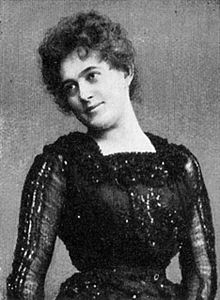Agnes Sorma
Agnes Sorma (born May 17, 1862 in Breslau , Silesia ; † February 10, 1927 in Crown King, Arizona ; actually: Agnes Martha Caroline Zaremba (Saremba), also: Pallatschek , married Minotto ) was one with her stage name "Agnes Sorma" German actress .
life and work
Agnes Martha Caroline Zaremba became world famous as Agnes Sorma. Through her mother's second marriage, Agnes, the eldest of her three sisters, took on the name Pallatschek. At the age of 13, Agnes and one of her sisters were on stage for the first time in an amusing Viennese folk play in the Lobe Theater in Breslau . As a young actress, she performed in the provincial cities of Liegnitz , Görlitz , Posen , Weimar and Meiningen . In 1884, at the instigation of Ludwig Barnay, she finally came to the newly founded Deutsches Theater Berlin and, as a popular character actress, worked excellently in plays by Gerhart Hauptmann , Henrik Ibsen and Heinrich von Kleist . Her famous stage partner was Josef Kainz , her mentor Max Reinhardt and one of her young admirers the student Thomas Mann .
In 1890 she married the Italian Count Demetrius Minotto. After the birth of her son in 1891, Agnes devoted herself primarily to her child. But after a short time she was back on the Berlin stages - in the Deutsches Theater , in the New Theater and in the Lessing Theater . Guest performances in many European cities increased her fame. During the World War she worked first as a nurse, then as a leading actress in a front theater. After the death of her mother and her husband in 1920, she left Berlin to live with her son James on a farm in Arizona ( USA ). In 1923 she visited Berlin for the last time. In February 1927 she died suddenly of a heart attack in her home in Crownsend. In September of this year, her body was transferred to Berlin and solemnly buried in the Minotto family's grave in the Wannsee cemetery on Lindenstrasse . The burial site is in the NT-84 section. It was dedicated to the city of Berlin as an honorary grave until 2015 .
Opinions
- Gerhart Hauptmann : “This dear and great artist was, so to speak, a queen of grace. Whether you saw her in company or on stage, you immediately felt that the Graces had kissed her in her cradle. "
- Thomas Mann : “There was the crowd, full of urges: to celebrate in a roaring crowd. Laurel and flowers were lifted up for you - but you spread your arms and shouted, although the roar devoured it: 'Goodbye'! "
- Else Lehmann (1866–1940), actress: “Agnes Sorma was simply delightful. I've never seen a better naive. What a charm, what a grace this woman had, what a magic she exuded! She was really a thief of the heart. "
- “Her artistic development, which took place before the eyes of the capital's public, moved in an ascending direction. She began with the roles of Hedwig Raabe , as a lively lover, pleasing but not significant, but captivating with her petite nature, her agile facial expressions, her shining eyes. From year to year she developed more vigorously and more independently. Their attitude, their playing style and their conception are modern and realistic without any trace of style. With a lot of skill she knows how to nestle into excellent patterns and at the same time add her own features to the picture. She is spirited and versatile and often knows how to bring out the affect scenes of newer drama in a sparkling way. "
literature
- Ludwig Eisenberg : Agnes Sorma . In: Large biographical lexicon of the German stage in the XIX. Century. Paul List, Leipzig 1903, p. 981 ( daten.digitale-sammlungen.de ).
- Julius Bab (ed.): Agnes Sorma: Ein Gedenkbuch; Evidence of their life and their art. N. Kampmann, Heidelberg 1927
- Brigitte Bruns: Sorma, Agnes, married Countess da Minotto. In: New German Biography (NDB). Volume 24, Duncker & Humblot, Berlin 2010, ISBN 978-3-428-11205-0 , p. 603 f. ( Digitized version ).
- Karla Krause: The actress Agnes Sorma: Attempt to analyze and evaluate her art of representation. Berlin, FU, Phil. F., Diss. V. May 7, 1969
- Berlin biographies (M) . In: Berlin monthly magazine ( Luisenstädtischer Bildungsverein ) . Issue 6, 1999, ISSN 0944-5560 , p. 110 ( luise-berlin.de - entry as Agnes Countess von Mio da Minotto ).
Web links
- portrait
- Agnes Sorma . In: East German Biography (Kulturportal West-Ost)
Individual evidence
- ↑ According to the information on the tombstone, born on May 17, 1865.
- ^ Sorma, Agnes in the German biography
- ^ Lovers of the German stage . In: The Gazebo . Volume 4, 1894, pp. 67 ( full text [ Wikisource ]).
| personal data | |
|---|---|
| SURNAME | Sorma, Agnes |
| ALTERNATIVE NAMES | Zaremba, Agnes Martha Caroline (maiden name); Pallatschek, Agnes (name after her mother's second marriage); Minotto, Agnes (name after their marriage in 1890) |
| BRIEF DESCRIPTION | German actress |
| DATE OF BIRTH | May 17, 1862 |
| PLACE OF BIRTH | Wroclaw , Silesia |
| DATE OF DEATH | February 10, 1927 |
| Place of death | Crown King, Arizona |


